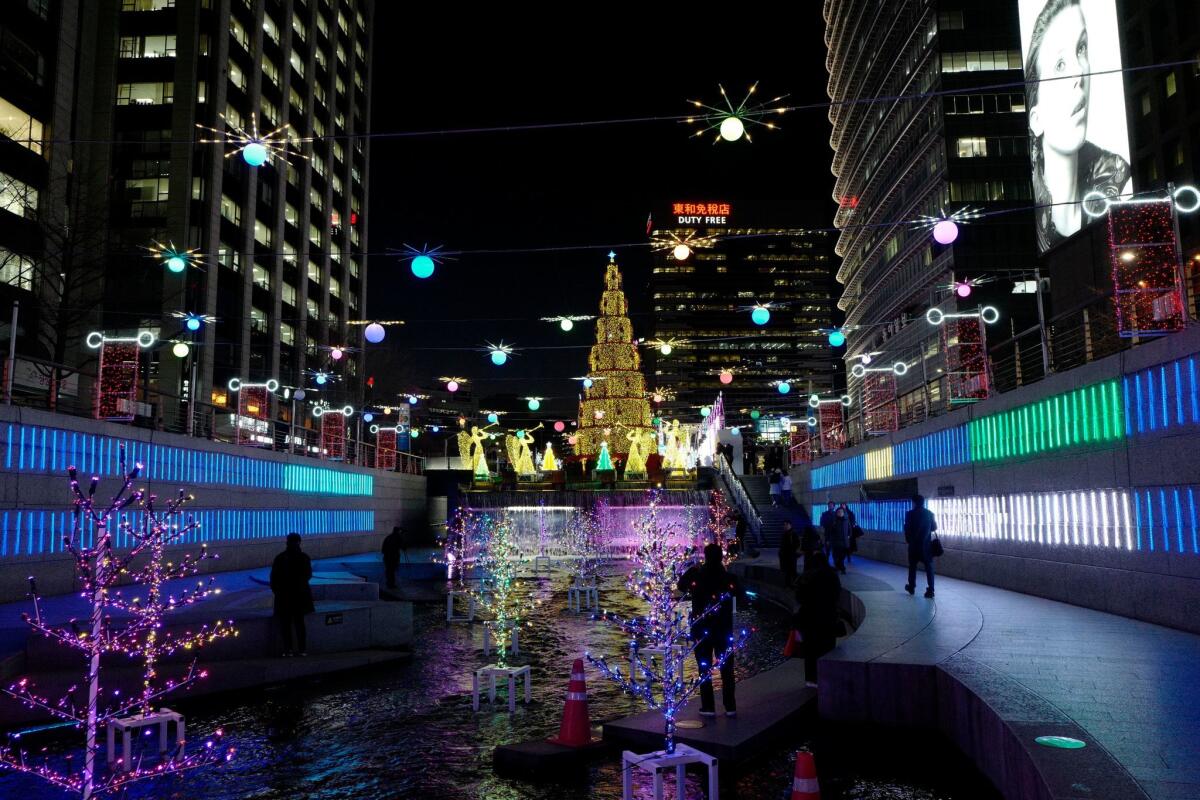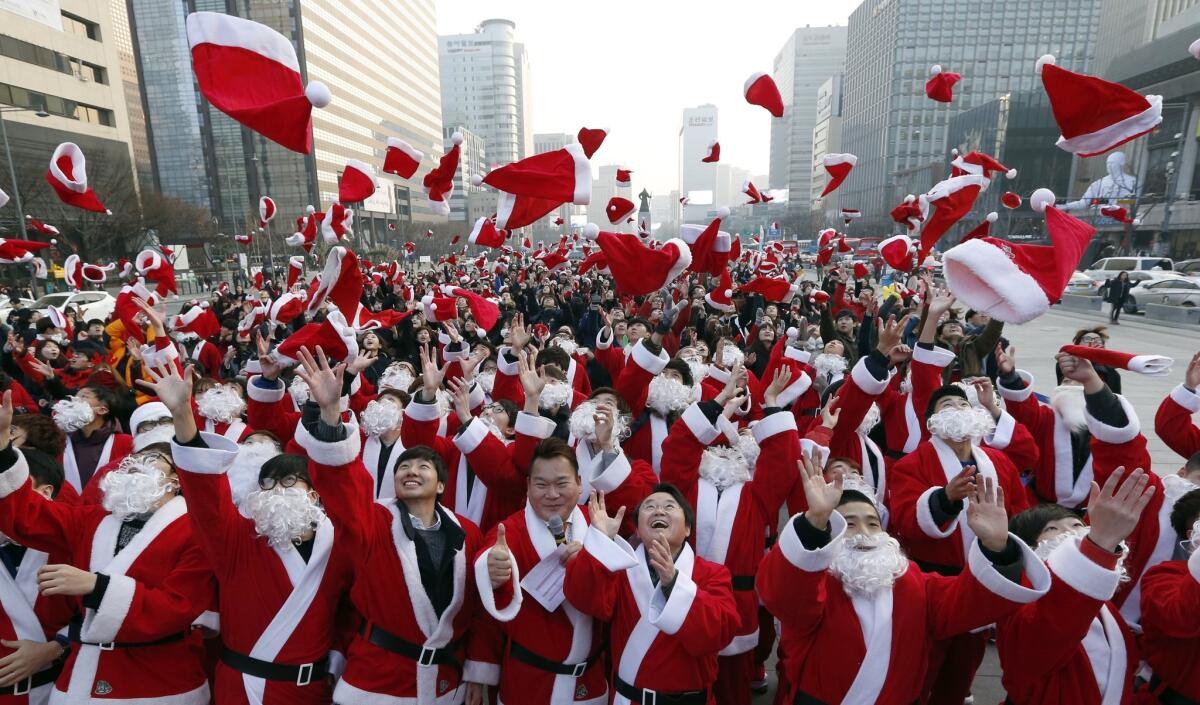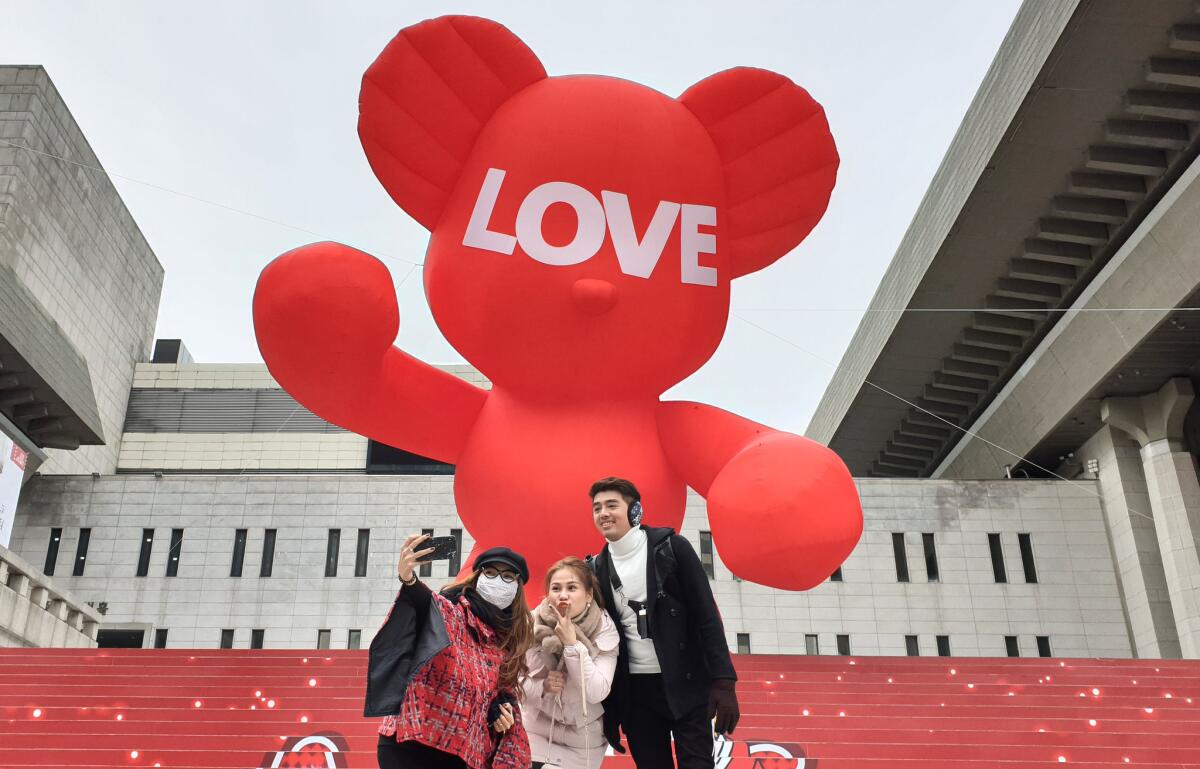More naughty than nice: In South Korea, motels, condoms and the pill are in hot demand for Christmas

- Share via
Reporting from Seoul — It’s Christmastime in Seoul — the city decked out in festive lights, storefronts adorned with red and white decorations and the steady clang of Salvation Army bells echoing through subway stops.
Here, though, it’s not the latest popular toys that fly off the shelves this time of year. In hot demand instead are birth control pills, condoms and Christmas-themed lingerie.
A reservation at one of Seoul’s many rent-by-the-hour motels on Christmas Day? Many book up weeks earlier, even at prices that can be double or more the normal rate.
Christmas, first brought to this nation by American missionaries in the late 19th century and designated a public holiday under U.S. military rule in the 1940s, has since evolved into a very different kind of celebration than the one across the Pacific.

Even though South Korea is about 30% Christian, Christmas is widely celebrated as a secular lover’s holiday not unlike Valentine’s Day, especially among the younger generation.
And because it’s customary for most unmarried young adults to live with their parents, Christmas has become a cherished occasion for couples to seek some privacy. So much so that a few years ago, the convenience store chain 7-Eleven Korea said that it sold more condoms on Christmas Day than any other day of the year, more than 2½ times as many as an average day.
“It’s just expected that you spend it with a lover,” said 24-year-old college student Jamie Park. “Society and social media ads reinforce that.”
U.S. has little to show for stalled nuclear talks with North Korea »
His girlfriend, Lucy Kim, 27, chimed in: “They say if you don’t have a lover to spend it with, it’s a lonely and miserable holiday.”
Park and Kim, newly dating as of about a month ago, stood on a frigid Seoul street corner giggling and feeding each other spoonfuls of ice cream, near a stream decorated with holiday lights. They were planning to go to a concert on Tuesday for their first Christmas together.
The two hadn’t yet settled on plans beyond the concert, but Park said several of his friends were complaining about the difficulty of booking a motel for Christmas night. One resourceful friend had booked a room a month ago.
How Christmas in Korea came to be more naughty than nice is a tale of the unlikely confluence of American cultural influence, military rule and young Koreans eager to party.
After initially being celebrated as a religion holiday here by a small number of Christians in the early part of the 20th century, Christmas gained popularity in the years after the Korean War truce in 1953. During those years, the typically strictly enforced nighttime curfew was lifted on Christmas Day by the U.S. forces controlling Seoul.
American-style dance halls were springing up around the same time, and while police usually cracked down on them as morally objectionable, they were given a pass on Christmas, according to Kang Jun-man, a communications professor at Chonbuk University who surveyed accounts in Korean newspapers about Christmas celebrations.
The holiday never took hold as a family celebration because most families already gather during two Korean holidays — Lunar New Year and the mid-autumn harvest festival.
By the 1960s, Christmas in Korea had became established as an occasion for cavorting for the young. In 1964, the Walkerhill Hotel held a massive Christmas Eve dance party that sold out despite steep ticket prices, and all of its 450 rooms were booked, according to a news article from the time.
A Korean-language editorial published on Dec. 24, 1965, decried that Christmas Eve had become “a night without rationality” and questioned: “Who made these youngsters roam the streets late at night and spend the night with obscene gestures?”
“The customs of the night have long been repressed by curfew,” the Joongang Ilbo editorial said, according to Kang. “And because of the freedom of the night, curfew-free Christmas Eve could never just be holy.”

There are, of course, Christians appalled by the way the holiday is celebrated in Korea.
The website GodPeople.com, an online Christian store and website, has been running an annual campaign since 2001 to “recover the true meaning of Christmas.”
“Nonbelievers think of it as a festival, an occasion to celebrate with family, friends and lovers,” said general manager Kim Hee-dong, who conceived of the campaign. “It was regrettable that the true meaning of Jesus’ birth was lost.”
But if Dr. Cho Byung-goo’s gynecology practice in the popular Hongdae area of Seoul is any indication, Christmas very much remains a lovers’ occasion. Each Dec. 26, Cho is invariably busy with several patients seeking emergency morning-after contraception.
“We don’t consider it a family holiday, so many of us end up spending it with lovers,” said Cho, a board member of the Korean Assn. of Obstetricians and Gynecologists, which has used the Christmas season as an opportunity to increase awareness of birth control.
“People get excited on Christmas Eve,” he said. “There are new encounters and opportunities to meet people.”
Follow me on Twitter @vicjkim
More to Read
Sign up for Essential California
The most important California stories and recommendations in your inbox every morning.
You may occasionally receive promotional content from the Los Angeles Times.











